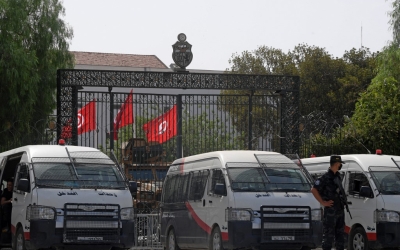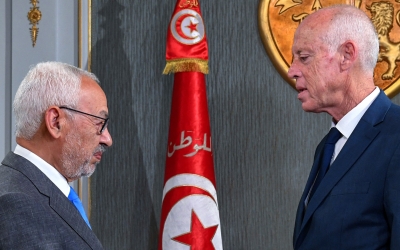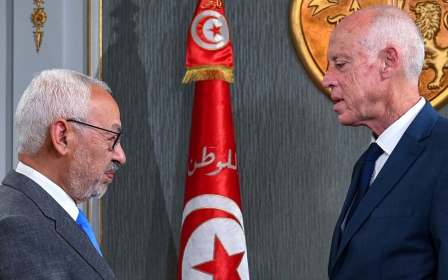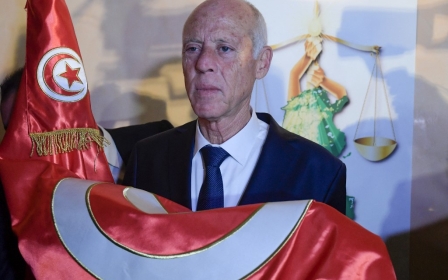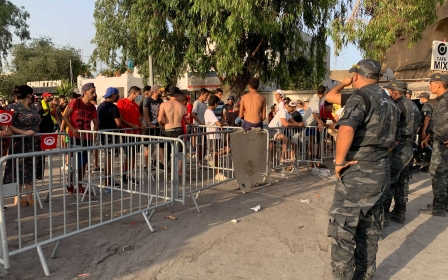Tunisia coup: US senator calls on Biden to probe possible Saudi and UAE role

US Senator Chris Murphy has called on the Biden administration to look into whether Saudi Arabia or the United Arab Emirates played a role in what is being described as a "constitutional coup" in Tunisia.
"What role are Saudi Arabia and UAE playing in the Tunisian crisis? The Biden Administration should seek the answer to this question post haste," Senator Murphy tweeted on Tuesday.
The lawmaker also shared several screenshots posted by Elham Fakhro, a Middle East political analyst and researcher, who pointed out that President Kais Saeid's takeover had been covered favourably by media in Saudi Arabia and the UAE.
On Monday, for example, Saudi Arabia's Okaz daily newspaper had an entire front page on Tunisia with the headline, "Tunisia rises up against the Brotherhood" - a reference to opposition party Ennahda's links to the Muslim Brotherhood group.
New MEE newsletter: Jerusalem Dispatch
Sign up to get the latest insights and analysis on Israel-Palestine, alongside Turkey Unpacked and other MEE newsletters
President Saeid announced the suspension of parliament, sacked the prime minister and assumed executive authority in the country on Sunday.
Opposition politicians from across the political spectrum have denounced the move, including Ennahda, the largest party in parliament.
Abu Dhabi and Riyadh applaud coup
A statement published by Saudi Arabia's official news agency, SPA, said Saudi Foreign Minister Faisal bin Farhan received a phone call from his Tunisian counterpart on Monday, during which he voiced the kingdom's support for "the security, stability and prosperity of the Tunisian Republic and its support for everything that would help achieve this".
For its part, the UAE has refrained from offering an official reaction to the coup. The Emirati news outlet 20FourMedia, however, published a piece on the turmoil, entitled: "A brave decision to save Tunisia".
Former Tunisian President Moncef Marzouki, who served from 2011 to 2014, told Al Jazeera on Monday that he had "no doubt that the UAE is behind this coup".
The UAE has long been accused of seeking to sabotage Tunisia's democratic transition, in an attempt to exclude Islamists and establish a government friendly to its own ambitions.
Abu Dhabi and Riyadh have both been highly critical of the Ennahda party, which formed a government after the 2011 revolution, as it has been described as an example of how political Islam and democracy could work together. The two Gulf powers also oppose Ennahda for its ties with Qatar and Turkey, regional foes.
The 2011 revolution in Tunisia also sparked what would be known as "the Arab Spring", which was seen as a major threat by the governments of the UAE and Saudi Arabia, which sought to preserve the authoritarian rule.
US calls for probes and military intervention
While the outcomes of the revolutions that erupted across the Middle East varied from success to disaster, Tunisia has been categorised in the US as the former. Seeking to salvage the revolution's victory, lawmakers in Washington have been quick to demand action.
Before his call for probes on the role played by Saudi Arabia and the UAE, Murphy expressed deep concern over the "political turmoil erupting" in Tunisia, calling for the country "to return to normal political order ASAP".
"We should look at how to use our aid and other diplomatic tools to address this crisis," he said.
Meanwhile, Republican Senator Lindsey Graham told the Washington Post that the Biden administration's failure to act quickly would have a devastating outcome and called for military intervention.
"This is the place where the Arab world’s movement to representative government and democracy began, and it’s clear to me indecisiveness in the face of aggression is just going to destroy this movement,” Senator Graham said.
"The United States and the western democracies need to be all in, on the ground in Tunisia, stopping this before it gets out of hand," he continued.
White House spokesperson Jen Psaki, in a press briefing on Monday, said that while the Biden administration was "concerned" by the events in Tunisia, it had not assessed whether the efforts to seize power by Saied amounted to a coup.
Later on Monday, Secretary of State Antony Blinken spoke by telephone with Saied, urging him to respect democracy and "maintain open dialogue with all political actors and the Tunisian people".
In a joint statement on Monday, the chair of the House Foreign Affairs Committee Gregory Meeks and Ted Deutch, who leads the subcommittee on the Middle East, called on Tunisian leaders to respect the rule of law.
"We are seriously concerned by events in Tunisia over the weekend that threaten to jeopardize Tunisia’s important democratic transition and constitutional reform process," the Democratic lawmakers said.
"We call on all parties to respect and adhere to the rule of law, work within established institutions, and engage in constructive dialogue to address differences. We implore all parties to refrain from violence and work towards a lasting solution to political tensions."
They added that the committee will work with President Joe Biden to help encourage Tunisia "back onto a democratic path".
Middle East Eye delivers independent and unrivalled coverage and analysis of the Middle East, North Africa and beyond. To learn more about republishing this content and the associated fees, please fill out this form. More about MEE can be found here.


